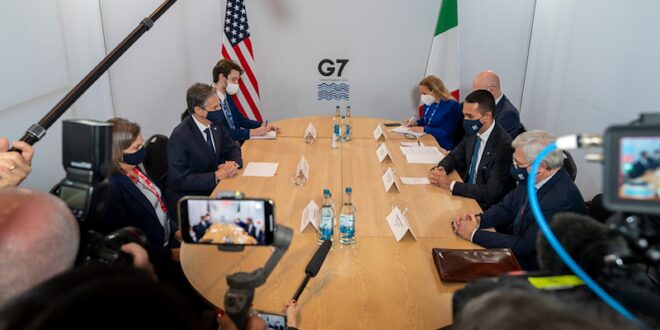U.S. Secretary of State Antony Blinken is attending talks that began Saturday among Group of Seven foreign ministers in Liverpool, with a call from British Foreign Secretary Liz Truss to unite against authoritarianism.
The appeal from Truss came as ministers from the world’s wealthiest democracies, informally known as the G-7, discuss Russia’s build-up of troops along the border it shares with Ukraine, containing Iran’s nuclear ambitions and addressing the military’s seizure of Myanmar.
“We need to come together strongly to stand up to aggressors who are seeking to limit the bounds of freedom and democracy,” Truss said as she opened the two-day session without mentioning specific countries.
The top U.S. diplomat met Friday with Truss and their counterparts from France and Germany and discussed how to advance the Iran nuclear talks. Blinken meets separately Saturday with the foreign ministers of Japan, Italy and Australia.
Blinken will also have a series of in-person meetings with foreign ministers from the Association of Southeast Asian Nations (ASEAN) as part of a December 9-17 trip that also will take him to Indonesia, Malaysia, Thailand and Hawaii.
Blinken’s trip is part of a U.S. effort to further advance its “strategic partnership” with ASEAN as President Joe Biden’s administration aims to begin a new “Indo-Pacific economic framework” in early 2022.
This marks the first time ASEAN countries were included in the G-7 foreign and development ministers’ meeting, being held in Liverpool.
The top diplomats are discussing China’s efforts to increase its influence in the Indo-Pacific region, as well as Russia’s troop buildup in Ukraine and the global coronavirus pandemic.
In Jakarta, Indonesia next week, Blinken will deliver remarks on the significance of the Indo-Pacific region and underscore the importance of the U.S.-Indonesia Strategic Partnership.
“The secretary will have an opportunity to discuss the president’s newly announced Indo-Pacific economic framework,” Daniel Kritenbrink, the State Department’s assistant secretary for East Asian and Pacific Affairs, told reporters in a call briefing. “President Biden is committed to elevating U.S.-ASEAN engagement to unprecedented levels,” he added.
Indonesia is the world’s most populous Muslim majority nation. Kritenbrink told VOA on Wednesday that Blinken will attend a vaccine clinic hosted by the largest faith-based nongovernmental organization in Indonesia.
Blinken then heads to Malaysia and Thailand, where he will attempt to advance U.S. ties and address shared challenges, including fighting COVID-19, building resilient supply chains, dealing with the climate crisis, and ensuring a free and open Indo-Pacific region.
The State Department said Blinken will “address the worsening crisis” in Myanmar in each country during his lengthy trip. The military in Myanmar, formerly known as Burma, seized power in a February coup, overthrowing the civilian government.
U.S. officials had indicated the new Indo-Pacific economic framework would include broad partnerships with nations in the region in critical areas such as the digital economy and technology, supply chain resiliency, and clean energy.
“The Indo-Pacific region is a critical part of our economy. It’s not just that it accounts for over half of the world’s population and 60% of global GDP” (gross domestic product), Jose Fernandez, undersecretary of state for economic growth, energy and the environment, said in a recent briefing.
“Seven of the top 15 U.S. export markets are in the Indo-Pacific. Two-way trade between the U.S. and the region was over $1.75 trillion,” he added.
There are, however, concerns that the U.S. is lagging behind China in deepening economic and strategic ties with ASEAN.
“ASEAN countries want more from Washington on the economic side, but the Biden administration’s proposed Indo-Pacific economic framework is likely to fall short of their expectations,” said Susannah Patton, a research fellow in the foreign policy and defense program at the United States Studies Center in Sydney.
“After RCEP enters into force, there will be two megatrade pacts in Asia: RCEP and CPTPP, and the United States is in neither,” said Patton, referring to the Regional Comprehensive Economic Partnership and the Comprehensive and Progressive Agreement for Trans-Pacific Partnership.
“China’s application to join CPTPP, a vehicle that was designed to promote U.S. economic ties with Asia, highlights Washington’s absence,” Patton told VOA Wednesday. Signed in 2018, the CPTPP is a free-trade agreement between Australia, Brunei, Canada, Chile, Japan, Malaysia, Mexico, Peru, New Zealand, Singapore and Vietnam.
In November 2020, 10 ASEAN member states and five additional countries (Australia, China, Japan, South Korea and New Zealand) signed the RCEP, representing around 30% of the world’s GDP and population. RCEP will come into force in January.
Others said the new Indo-Pacific economic framework appears to be not just about traditional trade, as Washington is signaling strategic interests in the region.
 Eurasia Press & News
Eurasia Press & News




